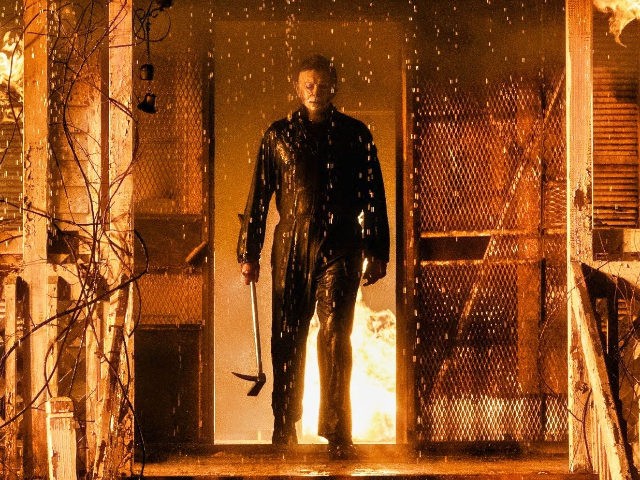Artists who delve into matters of the macabre have a two-fold task: usher people to a place they prefer not to venture but a place they like all the same; darken their spirits without leaving them spiritless; unsettle their foundations until they give thanks for having been settled at all.
Like a pendulum, the artist swings between two opposing dichotomies, imbibing the best of both until a stable bridge springs forth – a palindrome of equal parts order and disorder.
When it comes to the film composer, the macabre can be treacherous terrain. After forging this thing of beauty in a pit of ugliness, the composer must then use it to punctuate a dramatic event. Like a muted Greek chorus, they guide us through the throes of pathos, confidently signaling to us from the wings without ever intruding upon the stage. Too harmonious, the audience will sense manipulation and grow disdainful; too discordant, they sense ineptitude and grow disquieted.
With those parameters in mind, several considerations were made when curating the “Top 10 Horror Film Scores of All Time.” 1.) Does the score underline the images presented? 2.) Does the score elevate the film without superseding it? 3.) Does the score evolve throughout the film while staying true to its central theme? In some cases, a great horror film score may coincide with a great horror film, in other cases, a great horror film score may coincide with only a good or even mediocre horror film. They are not mutually exclusive.
Enjoy.
1. Psycho (1960)
Out of composer Bernard Hermann, the modern horror film score was born. Not a single horror film has since existed that doesn’t owe a debt of gratitude to Bernard Hermann’s score or Alfred Hitchcock’s revolutionary masterpiece. Not one.
Honorable Mentions: Jaws (1975), Rosemary’s Baby (1968), The Texas Chainsaw Massacre (1974), Interview with the Vampire (1994), The Fly (1986), Poltergeist (1982), Alien (1979), It Follows (2015), Night of the Living Dead (1968), Carrie (1976)
2. Halloween (1978)
John Carpenter’s theme has become as synonymous with the Halloween season as Nat King Cole with Christmas. No debate here: the movie would not be the same without this masterstroke of music genius. Period.
3. A Nightmare on Elm Street (1984)
Wes Craven’s blend of slasher and fantasy showed that not all killers wear a mask and stalk babysitters in the dark; some meet us in our nightmares, the kind where we don’t wake up and say, “It was only a dream.” Charles Bernstein’s iconic score invites us through the looking glass into a dreamland of jagged edges.
4. The Silence of the Lambs (1991)
America’s fascination with true crime in the wake of Ted Bundy, Ed Gein, and Charles Manson wormed its way into the pop-cultural zeitgeist with director Jonathan Demme’s magnum opus. Composer Howard Shore, who would go on to enliven Peter Jackson’s “Lord of the Rings,” mourns the loss of innocence and longs to rectify the injustice of having ever lost it.
5. The Exorcist (1973)
Hollywood can parody it a thousand times or weave a thousand sequels and spinoffs, no amount of commercial plunging could ever hollow out William Friedkin’s passionate portrayal of a doubting Catholic priest rising to save an innocent girl’s soul from the Father of Lies personified. Though not written directly for the film, Mike Oldfield’s “Tubular Bells” reminds us that evil always lurks in the shadows, patiently waiting to overtake us if we let our guard down.
6. The Shining (1980)
Author Stephen King hated Stanley Kubrick’s adaptation of his book because he did not understand his own story: once a father (or any parent for that matter) crosses the line into total depravity, there is no going back. Though only a handful of credits to their name, Wendy Carlos’ and Rachel Elkind’s score pins you to your seat and demands you witness Jack Torrance’s embrace of the sinister one lurking within.
7. The Thing (1982)
Director John Carpenter successfully updated this 1950s Howard Hawks production about a shapeshifting alien into a claustrophobic, atmospheric, unsettling piece of science-fiction horror set in an arctic outpost. The great Ennio Morricone’s icy score reminds us that sometimes isolation is preferable to whatever dark forces that wish to impede upon it.
8. Black Christmas (1974)
One of the greatest slasher films ever made, director Bob Clark ventured into territory that few filmmakers would dare to step foot in and did the unthinkable: creating an equally terrifying horror film and thematic Christmas film all at once. “Silent Night” as a herald of doom? Check. Carolers who make your skin crawl? Check. Throw in a little of composer Carl Zittrer’s ambient score and this movie will scare the figgy pudding out of you.
9. The Vanishing (1988)
Before Hollywood neutered this unwavering exploration of a man’s deadly obsession to uncover the truth about the mysterious disappearance of his girlfriend, Dutch director George Sluizer delivered a bleak-yet-poetic tale about the price of attaining closure. Through his use of a synthesized guitar, composer Henny Vrienten evokes the desolation of lost love and the malevolence of trying to reclaim it.
10. 28 Days Later (2002)
Director Danny Boyle ushered the zombie genre into the 21st century through this exploration of chaotic rage and the heights we climb or the depths we plunge to tame it. Like a flatlining heart monitor steadily rising into a pulse beyond all control, composer John Murphy’s ceaseless build from a cold piano into a rock cacophony ascends us up a neverending stairwell into madness.

COMMENTS
Please let us know if you're having issues with commenting.